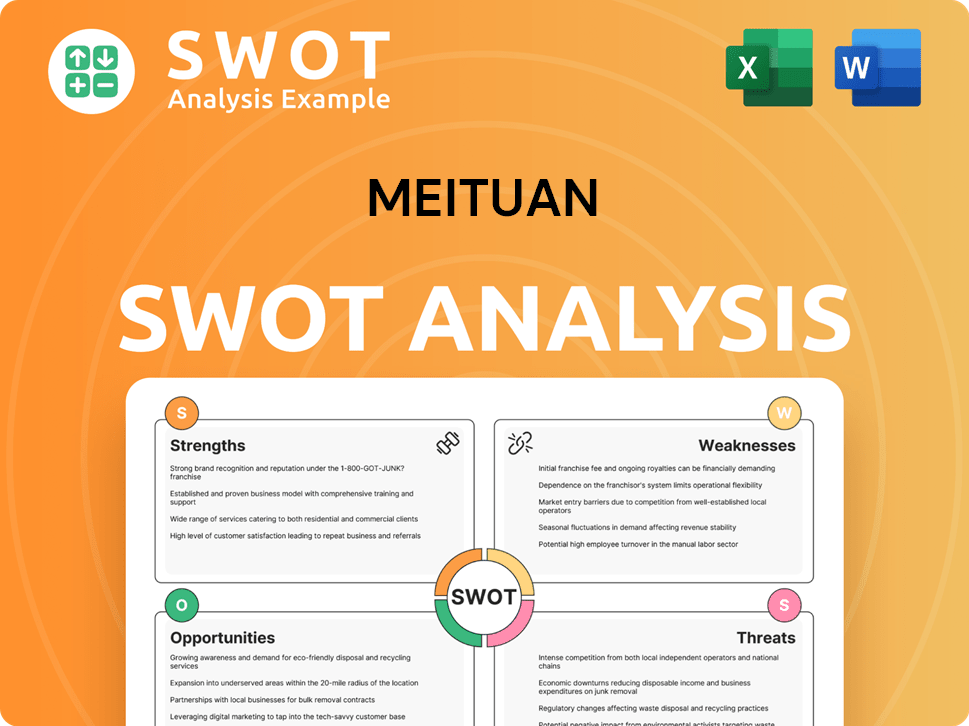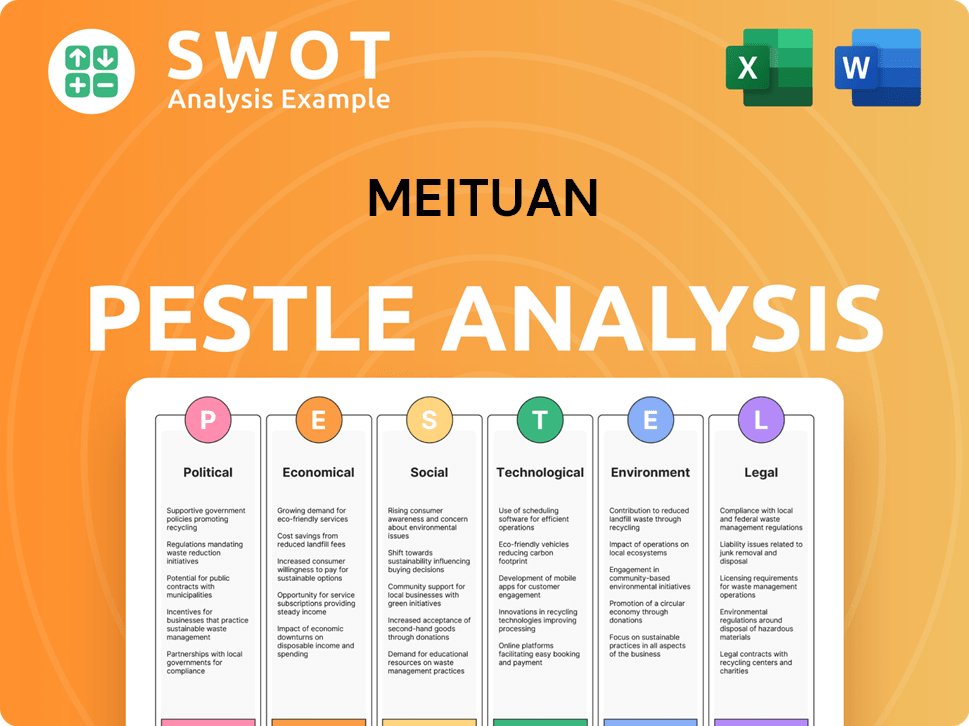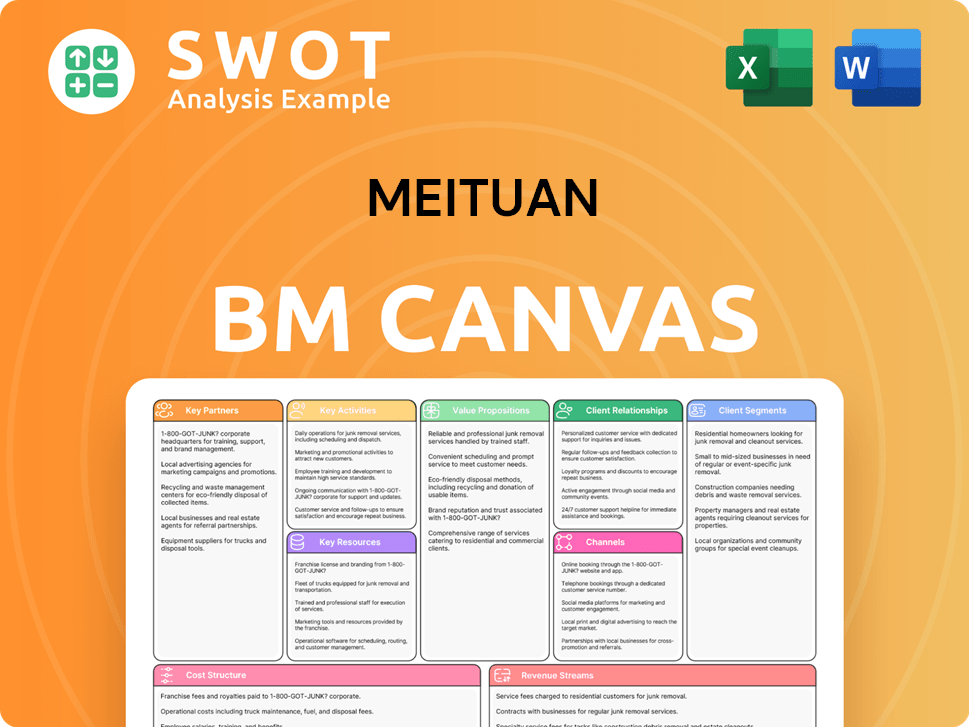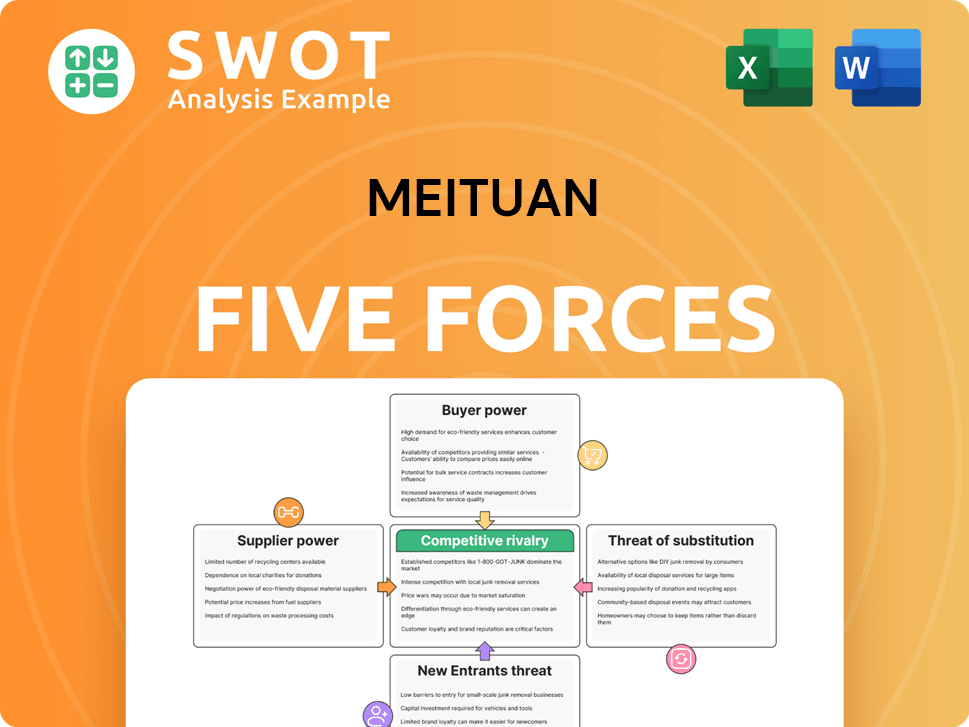Meituan Bundle
Who Really Owns Meituan?
Unraveling the ownership of a tech giant like Meituan is key to understanding its future. The 2015 merger with Dianping was a pivotal moment, reshaping its market position and ownership structure. Founded by Wang Xing, Meituan's journey from a group-buying platform to China's leading on-demand service provider is a story of strategic evolution. Discover the intricate web of Meituan SWOT Analysis and its influence on the company's trajectory.

Understanding the "Meituan owner" and "Meituan ownership" is crucial for investors and analysts. This exploration will reveal the "Meituan company ownership structure," detailing the roles of its founders, key investors, and the impact of public shareholders. We'll examine who are the major shareholders of Meituan, and trace how these stakes have shifted over time, influencing its governance and strategic path, including the "Meituan parent company."
Who Founded Meituan?
The story of Meituan, a leading player in China's tech landscape, begins with its founder, Wang Xing. Wang Xing, a seasoned entrepreneur, launched the company in March 2010 with a clear vision: to revolutionize the service industry using internet technology. His previous ventures, such as Xiaonei and Fanfou, provided him with valuable experience that he leveraged in building Meituan.
Early ownership of Meituan was shaped by strategic investments from prominent venture capital firms and tech giants. These early investments were crucial in fueling Meituan's growth and expansion. The company's journey reflects a strategic evolution in its ownership structure, significantly influencing its market position and strategic direction.
The early days saw Meituan secure initial funding from key investors, setting the stage for its ambitious growth plans. The company's early success was marked by significant funding rounds and a strategic merger that reshaped its ownership landscape.
Wang Xing founded Meituan in March 2010. The initial funding of $12 million came from Sequoia Capital in August 2010.
In July 2011, Meituan received a $50 million Series B round led by Alibaba. This investment was a significant boost for the company.
Tencent Holdings invested in Dianping, which later merged with Meituan, becoming a major shareholder. This marked a shift in the company's ownership.
The merger with Dianping in October 2015 formed Meituan-Dianping, consolidating its market position. This strategic move reshaped the ownership structure.
Following the merger, Alibaba divested its minority stake in Meituan. This was a strategic shift in the company's ownership.
Tencent emerged as the primary backer of the newly combined Meituan-Dianping. This solidified Tencent's influence over the company.
The evolution of Meituan's ownership reflects strategic shifts and key investments that propelled its growth. The merger with Dianping in 2015 was a pivotal moment, reshaping the company's market position and investor landscape. Following the merger, Tencent became the primary backer, influencing the company's trajectory. For a deeper understanding of the company's operations, consider exploring the Revenue Streams & Business Model of Meituan. As of the latest available data, Meituan's market capitalization is substantial, reflecting its dominant position in the Chinese market. The company's success is a testament to its strategic vision and ability to adapt to market dynamics. The Meituan company continues to evolve, with its ownership structure playing a crucial role in its ongoing development.
Here are some key takeaways about Meituan ownership:
- Wang Xing founded Meituan in March 2010.
- Sequoia Capital provided initial funding.
- Alibaba and Tencent were significant early investors.
- The merger with Dianping in 2015 was a pivotal event.
- Tencent became the primary backer after the merger.
Meituan SWOT Analysis
- Complete SWOT Breakdown
- Fully Customizable
- Editable in Excel & Word
- Professional Formatting
- Investor-Ready Format

How Has Meituan’s Ownership Changed Over Time?
The evolution of Meituan's ownership structure has been shaped by key events, including its initial public offering (IPO) and the strategic involvement of major shareholders. The company, initially known as Meituan-Dianping, rebranded to Meituan on September 30, 2020. A significant milestone was its debut on the Hong Kong Stock Exchange (SEHK: 3690) on September 20, 2018, with an IPO price of HK$69 per share. This listing was particularly notable as Meituan adopted a dual-class share structure, a move that allowed the founders to retain significant control even with a minority economic interest. This structure has played a crucial role in the company's governance and strategic direction.
The dual-class share structure has been instrumental in maintaining leadership stability while raising substantial capital. This structure has allowed the founders and management to retain significant control, even if they hold a minority economic interest. This structure is a common practice among tech companies, allowing founders to maintain control while attracting investment.
| Event | Date | Impact |
|---|---|---|
| Name Change | September 30, 2020 | Simplified brand identity. |
| IPO on HKEX | September 20, 2018 | Raised capital and established public market valuation. |
| Dual-Class Share Structure | September 20, 2018 | Maintained founder control. |
As of May 29, 2025, the major shareholders and their stakes are a critical aspect of understanding Meituan's ownership. Tencent Holdings holds an 18% stake, making it a significant investor. Wang Xing, the founder and CEO, holds approximately a 10% stake as of May 29, 2025, and maintains significant control through his Class A shares. As of March 22, 2024, Wang Xing beneficially owned 515,869,783 Class A shares, representing approximately 44.33% of the voting rights for most shareholder resolutions. Mu Rongjun, a co-founder, also holds Class A shares, representing approximately 7.25% of the voting rights as of March 22, 2024. Institutional investors also play a major role in Meituan's ownership.
Understanding the ownership structure of a company like Meituan is crucial for investors and stakeholders. The dual-class share structure allows founders to maintain control, which can influence long-term strategic decisions. The presence of major institutional investors also impacts corporate governance and strategy.
- Tencent is a major shareholder, holding a significant stake.
- Wang Xing, the founder, maintains substantial control through his shares.
- Institutional investors hold a considerable portion of the shares.
- The dual-class share structure gives the founders more voting power.
- To learn more about the company's growth, read about the Growth Strategy of Meituan.
Meituan PESTLE Analysis
- Covers All 6 PESTLE Categories
- No Research Needed – Save Hours of Work
- Built by Experts, Trusted by Consultants
- Instant Download, Ready to Use
- 100% Editable, Fully Customizable

Who Sits on Meituan’s Board?
As of April 30, 2025, the board of directors of the Meituan company includes both executive and independent non-executive directors. Wang Xing, the founder, serves as the Executive Director, Chief Executive Officer, and Chairman of the Board. Mu Rongjun is also an Executive Director and Senior Vice President. The independent non-executive directors include Orr Gordon Robert Halyburton, Leng Xuesong, Shum Heung Yeung Harry, and Yang Marjorie Mun Tak. This structure ensures a mix of operational expertise and independent oversight.
The board's composition reflects a blend of individuals with significant operational experience and those providing independent perspectives. This is crucial for strategic planning and maintaining corporate governance standards. The presence of both executive and independent directors helps in balancing the company's strategic vision with regulatory compliance and shareholder interests. This structure is a common practice among large public companies to ensure effective management and accountability.
| Director | Title | Role |
|---|---|---|
| Wang Xing | Founder, CEO, Chairman | Executive Director |
| Mu Rongjun | Senior Vice President | Executive Director |
| Orr Gordon Robert Halyburton | Independent Director | Independent Non-Executive Director |
| Leng Xuesong | Independent Director | Independent Non-Executive Director |
| Shum Heung Yeung Harry | Independent Director | Independent Non-Executive Director |
| Yang Marjorie Mun Tak | Independent Director | Independent Non-Executive Director |
Meituan operates with a weighted voting rights (WVR) structure. This means that different classes of shares have different voting powers. Class A shares have 10 votes each, while Class B shares have one vote, except for specific 'Reserved Matters'. This structure allows Wang Xing and Mu Rongjun, as WVR Beneficiaries, to maintain significant control, even if their economic interest is not a majority. This is a common strategy for tech companies to ensure founder-led vision. For more insights, explore the Growth Strategy of Meituan.
The WVR structure enables founders to retain control. This is a key aspect of who owns Meituan. This structure is designed to support long-term strategic goals.
- Class A shares have 10 votes.
- Class B shares have 1 vote.
- WVR structure centralizes decision-making.
- Board has key committees for governance.
Meituan Business Model Canvas
- Complete 9-Block Business Model Canvas
- Effortlessly Communicate Your Business Strategy
- Investor-Ready BMC Format
- 100% Editable and Customizable
- Clear and Structured Layout

What Recent Changes Have Shaped Meituan’s Ownership Landscape?
Over the past few years, Meituan's ownership has seen notable developments, particularly in its share buyback programs. The company has shown confidence in its valuation by repurchasing shares, aiming to enhance shareholder value. For instance, in January 2024, a $1 billion share buyback plan was announced, followed by an additional $2 billion plan in June 2024. As of March 31, 2024, approximately 44,131,100 shares, or 0.71% of its share capital, had been repurchased. By September 2024, the total repurchased shares reached 148 million, about 2.38% of its share capital since June 2024. The company's strategy involves a hefty US$4 billion share repurchase in 2024, with plans to maintain around US$1.5 billion annually from 2025 onwards to offset share-based compensation dilution and provide shareholder returns. This aggressive buyback strategy, especially when the stock traded at a lower Price-to-Book ratio in May 2025, indicates management's belief in the stock's undervaluation.
The company's expansion strategy also influences its ownership dynamics. Meituan is investing US$1 billion over five years to enter Brazil's food delivery market. Its overseas food delivery arm, 'Keeta,' has gained significant market share in Hong Kong and is expanding into the Middle East, targeting breakeven in Hong Kong by fiscal year 2026. These expansions are expected to contribute to increased losses in the new initiatives segment in the short term. Industry trends also reveal increased institutional ownership in companies like Meituan. As of May 23, 2025, institutional investors hold a substantial portion of Meituan's shares. While founder dilution is a natural part of growth for public companies, the dual-class share structure allows Wang Xing to maintain significant control despite his economic ownership being a minority.
| Metric | Details | Year |
|---|---|---|
| Market Share (Food Delivery) | Approximately 65% | 2024 |
| R&D Investment | Over RMB 20 billion | 2024 |
| Share Buyback (2024) | US$4 billion | 2024 |
| Share Buyback (Expected from 2025) | US$1.5 billion annually | 2025 onwards |
Meituan's continued leadership in the Chinese food delivery market, with approximately 65% market share in 2024, is a key aspect of its ownership and strategic focus, despite competition from rivals. The company's commitment to technology and innovation, with over RMB 20 billion invested in R&D as of 2024, and exploration of advanced technologies like AI and autonomous delivery vehicles, also shapes its long-term ownership structure and investor interest. These factors collectively influence the company's ownership profile and its strategic direction.
Wang Xing is the CEO of Meituan, and he also holds a significant position in the company's ownership structure. His influence is maintained through a dual-class share structure.
Yes, Meituan is a public company. It is listed on the Hong Kong Stock Exchange. The company's financial performance and ownership structure are subject to public scrutiny and regulatory requirements.
Meituan was co-founded by Wang Xing. He remains a key figure in the company's strategic direction and ownership, influencing its operations and future developments.
Meituan operates a super-app business model, primarily focusing on food delivery, local services, and travel. This diverse approach impacts its ownership structure and market position.
Meituan Porter's Five Forces Analysis
- Covers All 5 Competitive Forces in Detail
- Structured for Consultants, Students, and Founders
- 100% Editable in Microsoft Word & Excel
- Instant Digital Download – Use Immediately
- Compatible with Mac & PC – Fully Unlocked

Related Blogs
- What are Mission Vision & Core Values of Meituan Company?
- What is Competitive Landscape of Meituan Company?
- What is Growth Strategy and Future Prospects of Meituan Company?
- How Does Meituan Company Work?
- What is Sales and Marketing Strategy of Meituan Company?
- What is Brief History of Meituan Company?
- What is Customer Demographics and Target Market of Meituan Company?
Disclaimer
All information, articles, and product details provided on this website are for general informational and educational purposes only. We do not claim any ownership over, nor do we intend to infringe upon, any trademarks, copyrights, logos, brand names, or other intellectual property mentioned or depicted on this site. Such intellectual property remains the property of its respective owners, and any references here are made solely for identification or informational purposes, without implying any affiliation, endorsement, or partnership.
We make no representations or warranties, express or implied, regarding the accuracy, completeness, or suitability of any content or products presented. Nothing on this website should be construed as legal, tax, investment, financial, medical, or other professional advice. In addition, no part of this site—including articles or product references—constitutes a solicitation, recommendation, endorsement, advertisement, or offer to buy or sell any securities, franchises, or other financial instruments, particularly in jurisdictions where such activity would be unlawful.
All content is of a general nature and may not address the specific circumstances of any individual or entity. It is not a substitute for professional advice or services. Any actions you take based on the information provided here are strictly at your own risk. You accept full responsibility for any decisions or outcomes arising from your use of this website and agree to release us from any liability in connection with your use of, or reliance upon, the content or products found herein.